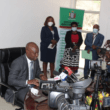The Report of the Auditor General on the Accounts of the Republic for the financial year ended 31st December 2018 is out, highlighting an increase in accounted for stores from K6 million in 2017 to K134 million in 2018.
And according to the report, uncollected revenue was the highest irregularity at K418 million.
Meanwhile, under the Farmer Input Support Programme (FISP), the report highlights unacquited inputs amounting to K24 million.
According to a statement issued by Office of the Auditor General head of public relations Ellen Chikale, Thursday, the office was worried about the increase in unaccounted for stores because it could be a way of siphoning public resources.
“The Report of the Auditor General on the Accounts of the Republic for the financial year ended 31st December 2018 is out with evident irregularities in some Ministries, Provinces and other Spending Agencies (MPSAs). The Report which was tabled on floor of the house is now a public document and can be accessed from the Office of the Auditor General in Long acres and the Office website: www.ago.gov.zm. The report has highlighted failure to collect revenue as the highest irregularity for the period under review at 418 million kwacha. The implication of this irregularity is that the total revenue collected by government is less thereby affecting the much needed development and delivery of services. The second highest irregularity is unaccounted for stores at K134 million. This anomaly speaks to there being no evidence of how the missing stores items were received, utilized or disposed is becoming of great concern to the office as it could be a way of siphoning public resources. The amount in question shows huge jump from K6 million in 2017 to K134 million in 2018,” Chikale stated.
She stated that another irregularity was underdelivered material, which jumped from K1 million in 2017 to K9 million in 2018.
“Other irregularities that have increased in the report are overpayments from 7 million kwacha in 2017 to 16 million kwacha 2018, Underdelivered materials from 1 million kwacha in 2017 to 9 million kwacha 2018 and Misapplication of Funds from 61 million kwacha 2017 to 62 million kwacha in 2018. Although Misapplication of Funds shows a minimal increase of about 1 million kwacha it continues to be an area of high concern for the Office as it entails that institutions applied funds budgeted for a specific programme on unrelated programmes without the authority from Secretary to the Treasury thereby depriving the beneficiaries of the much needed benefits from the said programmes. Under the Farmer Input Support Programme (FISP) the report highlights unacquited inputs amounting to 24 million kwacha,” Chikale stated.
She noted that there had been some reductions in unaccounted for funds and unretired imprest.
“The report has however also seen some reductions in Unaccounted for funds from 31 million kwacha in 2017 to 26 thousand kwacha, Irregular payments from 22 million kwacha in 2017 to 13 million kwacha in 2018, Unretired accountable imprest from 4 million kwacha in 2017 to 668 thousand kwacha and wasteful expenditure from 8 million kwacha to 223 thousand kwacha among others. These improvements need to be sustained so that they are not cancelled by the huge irregularities on the other hand,” Chikale stated.
“The Report contains fifty-four (54) paragraphs consisting of forty-one (41) paragraphs on audit matters and thirteen (13) paragraphs on other matters. The forty-one (41) paragraphs on audit matters reflect issues that could not be resolved during the audit process and whose corrective actions were not undertaken as at 20th September 2019…The nation can take comfort in the fact that the audit was conducted in accordance with the International Standards of Supreme Audit Institutions (ISSAIs) which are the standards relevant for the audit of Public Sector entities and are issued by the International Organisation for Supreme Audit Institutions (INTOSAI) to which the Office of the Auditor General is a member.”













One Response
Thank you for this article ba ND, keep informing us matters of such caliber and of interest to the whole nation.
How I wish next year, there will be a further reduction on “The report has however also seen some reductions in Unaccounted for funds from 31 million kwacha in 2017 to 26 thousand kwacha, Irregular payments from 22 million kwacha in 2017 to 13 million kwacha in 2018, Unretired accountable imprest from 4 million kwacha in 2017 to 668 thousand kwacha and wasteful expenditure from 8 million kwacha to 223 thousand kwacha among others. These improvements need to be sustained so that they are not cancelled by the huge irregularities on the other hand,” Chikale stated.